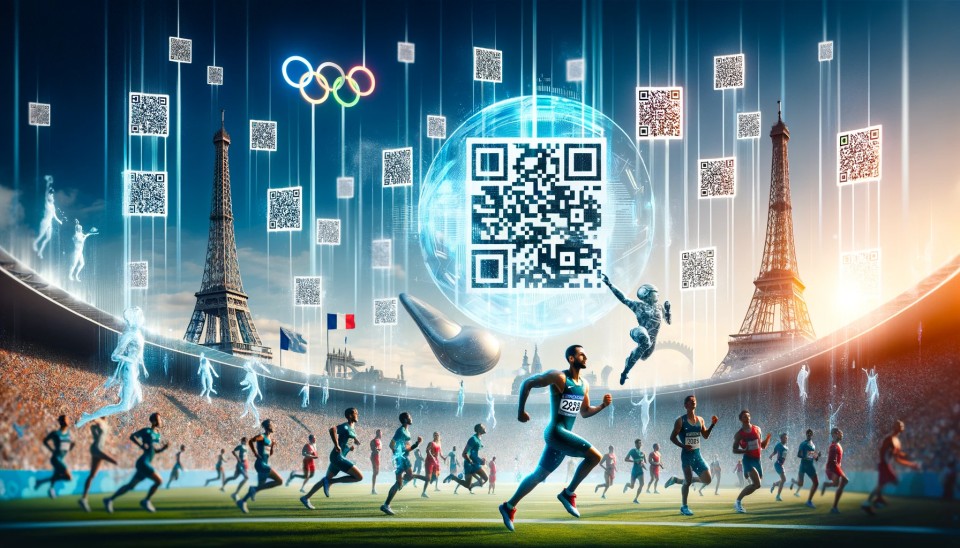Mandatory QR codes, AI-controlled cameras: mass surveillance at the Olympic Games
A network of AI-powered mass surveillance cameras being erected across Paris for this year’s Olympic Games (which will take place between July 26 – August 11) has rights groups sounding the alarm over potential government misuse.

AI crowd-scanning
In March last year, France’s Parliament authorized a mass surveillance network to be built across the capital to tackle “security risks” during the games. The network includes public-facing cameras which will scan crowds and process the images in real time using an AI algorithm.
Law enforcement, public transportation security officials, and firefighters will have access to the camera feeds.
Legislation passed by Parliament allows the surveillance technology to scan for eight emergency scenarios: somebody on the ground, the presence or use of weapons, people in forbidden zones, abnormally large crowds, abandoned packages, fire, crowd movement, and traffic violations.
Over 60 MPs opposed the bill authorizing the cameras, and groups such as Amnesty International condemned the decision over potential privacy violations. But in May last year, the French Constitutional Council — France’s highest constitutional authority — ruled in favor of the bill.
The software has been tested at recent large events, including concerts by Depeche Mode, Taylor Swift, and the Black Eyed Peas. It has also been tested on crowds at the Cannes Film Festival and a sporting match between Paris Saint-Germain and Olympique Lyon.
‘Little to no oversight’
Daniel Leufer, a senior policy analyst at digital rights group AccessNow, warns that just because personal profiling is not included in these scenarios, it does not mean it is out of the question.
“One overarching concern is that while the majority of these use cases may not seem to involve revealing the identity of, or profiling people, they still require the deployment of a surveillance infrastructure that is always one software update away from being able to do the most invasive kinds of mass surveillance,” Leufer said.
Although the Olympics will run from July 26th to August 11th of this year, the surveillance infrastructure will remain in place at least until March 31, 2025.
“Members of the public will have little to no oversight about what types of things these systems are monitoring, what updates are made etc, and so we will get the inevitable chilling effect that comes from this type of public surveillance,” added Leufer.
An ‘illusion’ that ‘we are banning the technology’
The law reportedly does not permit the software to be used invasively, which would include the use of facial or gait recognition. But Katia Roux, advocacy lead at Amnesty International France, says clauses in the legislation allow “competent authorities” to use the technology intrusively for certain purposes like national security.
“This is not a ban. That’s actually an authorization for law enforcement agencies. People have this illusion that because it says we are banning the technology — except in this, this and this situation — it’s fine, but these situations are the most problematic ones,” Roux told The Japan Times.
The AI algorithmic software has been developed by four companies: Wintics, Orange Business, ChapsVision and Videtics. Wintics Co-Founder Matthias Houllier said the algorithms are not set up for facial recognition.
“There’s no personal identification method in our algorithms,” he told Reuters. “It’s technically excluded.”
But Roux argues that facial recognition is an easy configuration if authorities choose to deploy it.
“Software that enables AI-powered video surveillance can easily enable facial recognition. It’s simply a configuration choice,” she said.
As of 2020, Paris sported an estimated 33,479 cameras, translating to about 3.06 cameras per 1,000 people.
Mandatory QR codes
Last year, Paris Police Prefect Laurent Nuñez told Le Parisien that Parisian residents who live near Olympic venues and wish to move freely about the city will need to apply for a QR code which will permit them to pass police barriers.
Residents will also need to register any visitors with the police. An estimated 700 bars and restaurants which will fall under certain security perimeters will only be accessible to those who can “justify” to police why they are visiting the establishments.
Between 30,000 to 40,000 police officers are expected to be deployed for the duration of the games.
Nuñez’s announcement drew heavy criticism from several French legislators who raised civil liberty concerns. Union of Democrats and Independents Senator Philippe Bonnecarrere called the security measures “the hallmark of a state of emergency.” Senator Nathalie Goulet, who said they are an “attack on freedoms,” noted that the QR code scheme would involve collecting and storing data on taxpayers. She demanded the police clarify the steps they will take to protect privacy rights.
La France Insoumise Deputy Eric Coquerel called the measures “scandalous, even worse than we feared.” Deputy Damien Maudet similarly added that the “Olympic Games will have a liberticidal taste.”
yogaesoteric
June 23, 2024
